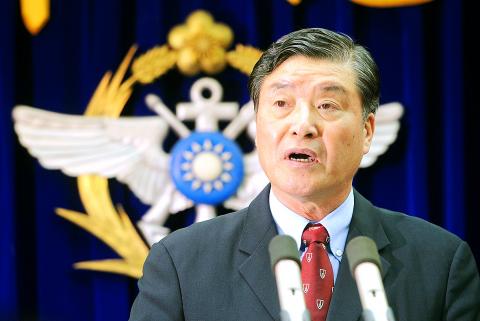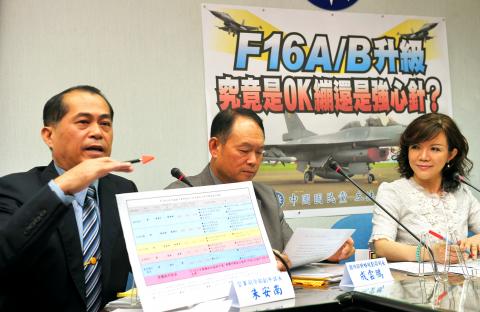The government has thanked the US for agreeing to help upgrade the air force’s F-16A/B fleet, saying it was an indication of the US taking concrete action to implement the Taiwan Relations Act.
At a press conference called late on Wednesday night, Minister of Foreign Affairs Timothy Yang (楊進添) hailed the administration of US President Barack Obama for “responding to our request proactively by taking concrete actions to approve” the upgrade.
The US government formally notified Congress on Wednesday of its intent to sell Taipei military equipment and services worth about US$5.85 billion. The package includes upgrades of Taiwan’s F-16A/Bs, along with pilot training and spare parts, but does not include new F-16C/Ds that Taipei had wanted to modernize its arsenal.

Photo: Liu Hsin-de, Taipei Times
Yang said that together with a previous arms sale worth US$12.5 billion, which the US offered Taiwan less than three years into President Ma Ying-jeou’s (馬英九) presidency, the US government has provided US$18.3 billion worth of weapons to Taiwan “on an unprecedented scale and pace.”
Ma yesterday also showed his thanks and reiterated his calls for the US to sell F-16C/Ds and other defensive weapons to Taiwan.
He stressed that buying weapons from the US does not signal any intention to engage in an arms race with China, but that it is necessary to maintain Taiwan’s defensive capabilities.

Photo: CNA
Ma added that these arms procurements were much larger than any under his two predecessors, former presidents Lee Teng-hui (李登輝) and Chen Shui-bian (陳水扁).
“The upgrade package will make the air force of the Republic of China the first fleet in the world equipped with AESA radars, which can effectively deal with [China’s] J-20s,” according to Chu An-nan (朱安南), deputy chief of the Air Force Headquarters.
However, polarized responses emanated from governing and opposition lawmakers.
Chinese Nationalist Party (KMT) Legislator Lin Yu-fang (林郁方) said that while the exclusion of F-16C/Ds from the package could bring to mind the phrase, “if you can’t have a fish, a shrimp can be just as good,” he said that he did not think the retrofit package was a shrimp. “It was a fish. In fact, a very big fish.”
Lin said he was “deeply moved” by the F-16A/B retrofit package because it was “far better than I had expected,” which he said showed the Obama administration “highly recognized” Ma’s efforts to pursue cross-strait peace and enhance Taiwan’s self-defense capability.
However, the Democratic Progressive Party (DPP) said the Ministry of National Defense and the Ministry of Foreign Affairs’ efforts to describe the US arms sale of F-16A/B upgrades as an “achievement” was regretful and contradictory.
“We don’t understand why the two ministries expressed gratitude when Taiwan came up short of its wish for F-16C/Ds procurement,” DPP spokesperson Kang Yu-cheng (康裕成) said, noting that Deputy Minister of National Defense Andrew Yang (楊念祖) in May explained to US officials why Taiwan desperately needs the F-16C/D and yet, on Wednesday night, he said the offered package was not a bad deal and he was not disappointed at all.
DPP Legislator Huang Wei-cher (黃偉哲) said the defense ministry was being contradictory when it said the upgraded F-16A/Bs would be better than the F-16C/Ds, yet at the same time said that it planned to push for the F-16C/D procurement.
DPP spokesperson Chen Chi-mai (陳其邁) said a number of US lawmakers expressed anger at the White House’s refusal to sell new jets to Taiwan and accused Obama of bowing to Chinese pressure, and yet “the defense ministry brags” about arms procurement and “describes it as an achievement.”
In Beijing, China’s Foreign Ministry condemned the sale as undermining overall ties and military exchanges. Chinese Vice Minister of Foreign Affairs Zhang Zhijun (張志軍) summoned US Ambassador Gary Locke in Beijing to complain. China’s Minister of Defense warned the US had “created severe obstacles for normal military-to-military exchanges between the two countries.”
The strong words are seen as rhetoric catering to the military and nationalistic public, who regard the US as an interloper that uses support for Taiwan as a means of restraining China’s rise, according to some observers.
Additional Reporting By CNA and AP

SECURITY: As China is ‘reshaping’ Hong Kong’s population, Taiwan must raise the eligibility threshold for applications from Hong Kongers, Chiu Chui-cheng said When Hong Kong and Macau citizens apply for residency in Taiwan, it would be under a new category that includes a “national security observation period,” Mainland Affairs Council (MAC) Minister Chiu Chui-cheng (邱垂正) said yesterday. President William Lai (賴清德) on March 13 announced 17 strategies to counter China’s aggression toward Taiwan, including incorporating national security considerations into the review process for residency applications from Hong Kong and Macau citizens. The situation in Hong Kong is constantly changing, Chiu said to media yesterday on the sidelines of the Taipei Technology Run hosted by the Taipei Neihu Technology Park Development Association. With

CARROT AND STICK: While unrelenting in its military threats, China attracted nearly 40,000 Taiwanese to over 400 business events last year Nearly 40,000 Taiwanese last year joined industry events in China, such as conferences and trade fairs, supported by the Chinese government, a study showed yesterday, as Beijing ramps up a charm offensive toward Taipei alongside military pressure. China has long taken a carrot-and-stick approach to Taiwan, threatening it with the prospect of military action while reaching out to those it believes are amenable to Beijing’s point of view. Taiwanese security officials are wary of what they see as Beijing’s influence campaigns to sway public opinion after Taipei and Beijing gradually resumed travel links halted by the COVID-19 pandemic, but the scale of

A US Marine Corps regiment equipped with Naval Strike Missiles (NSM) is set to participate in the upcoming Balikatan 25 exercise in the Luzon Strait, marking the system’s first-ever deployment in the Philippines. US and Philippine officials have separately confirmed that the Navy Marine Expeditionary Ship Interdiction System (NMESIS) — the mobile launch platform for the Naval Strike Missile — would take part in the joint exercise. The missiles are being deployed to “a strategic first island chain chokepoint” in the waters between Taiwan proper and the Philippines, US-based Naval News reported. “The Luzon Strait and Bashi Channel represent a critical access

Pope Francis is be laid to rest on Saturday after lying in state for three days in St Peter’s Basilica, where the faithful are expected to flock to pay their respects to history’s first Latin American pontiff. The cardinals met yesterday in the Vatican’s synod hall to chart the next steps before a conclave begins to choose Francis’ successor, as condolences poured in from around the world. According to current norms, the conclave must begin between May 5 and 10. The cardinals set the funeral for Saturday at 10am in St Peter’s Square, to be celebrated by the dean of the College